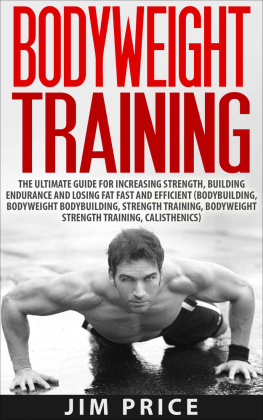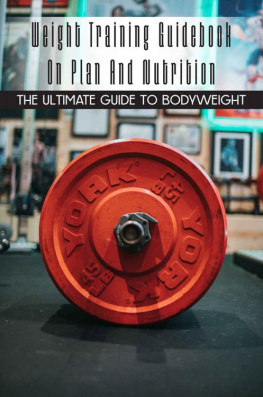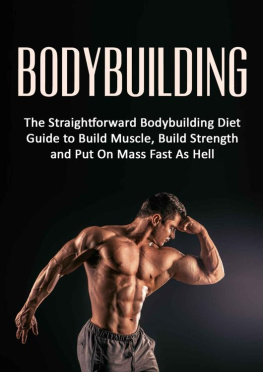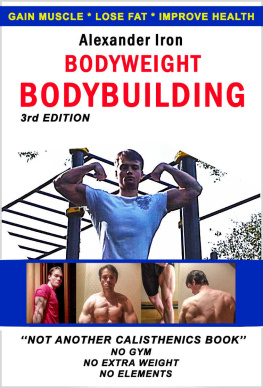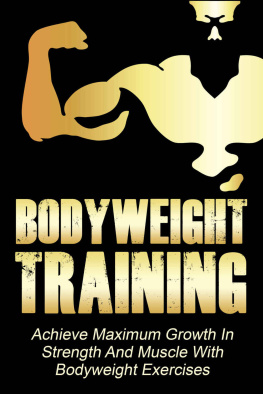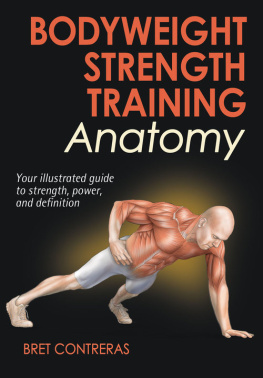Price - Bodyweight Training:The Ultimate Guide for Increasing Strength,Building Endurance and Losing Fat Fast and Efficient (Bodybuilding, Bodyweight Bodybuilding, Strength Trai
Here you can read online Price - Bodyweight Training:The Ultimate Guide for Increasing Strength,Building Endurance and Losing Fat Fast and Efficient (Bodybuilding, Bodyweight Bodybuilding, Strength Trai full text of the book (entire story) in english for free. Download pdf and epub, get meaning, cover and reviews about this ebook. year: 2015, genre: Romance novel. Description of the work, (preface) as well as reviews are available. Best literature library LitArk.com created for fans of good reading and offers a wide selection of genres:
Romance novel
Science fiction
Adventure
Detective
Science
History
Home and family
Prose
Art
Politics
Computer
Non-fiction
Religion
Business
Children
Humor
Choose a favorite category and find really read worthwhile books. Enjoy immersion in the world of imagination, feel the emotions of the characters or learn something new for yourself, make an fascinating discovery.
- Book:Bodyweight Training:The Ultimate Guide for Increasing Strength,Building Endurance and Losing Fat Fast and Efficient (Bodybuilding, Bodyweight Bodybuilding, Strength Trai
- Author:
- Genre:
- Year:2015
- Rating:3 / 5
- Favourites:Add to favourites
- Your mark:
- 60
- 1
- 2
- 3
- 4
- 5
Bodyweight Training:The Ultimate Guide for Increasing Strength,Building Endurance and Losing Fat Fast and Efficient (Bodybuilding, Bodyweight Bodybuilding, Strength Trai: summary, description and annotation
We offer to read an annotation, description, summary or preface (depends on what the author of the book "Bodyweight Training:The Ultimate Guide for Increasing Strength,Building Endurance and Losing Fat Fast and Efficient (Bodybuilding, Bodyweight Bodybuilding, Strength Trai" wrote himself). If you haven't found the necessary information about the book — write in the comments, we will try to find it.
Price: author's other books
Who wrote Bodyweight Training:The Ultimate Guide for Increasing Strength,Building Endurance and Losing Fat Fast and Efficient (Bodybuilding, Bodyweight Bodybuilding, Strength Trai? Find out the surname, the name of the author of the book and a list of all author's works by series.
Bodyweight Training:The Ultimate Guide for Increasing Strength,Building Endurance and Losing Fat Fast and Efficient (Bodybuilding, Bodyweight Bodybuilding, Strength Trai — read online for free the complete book (whole text) full work
Below is the text of the book, divided by pages. System saving the place of the last page read, allows you to conveniently read the book "Bodyweight Training:The Ultimate Guide for Increasing Strength,Building Endurance and Losing Fat Fast and Efficient (Bodybuilding, Bodyweight Bodybuilding, Strength Trai" online for free, without having to search again every time where you left off. Put a bookmark, and you can go to the page where you finished reading at any time.
Font size:
Interval:
Bookmark:
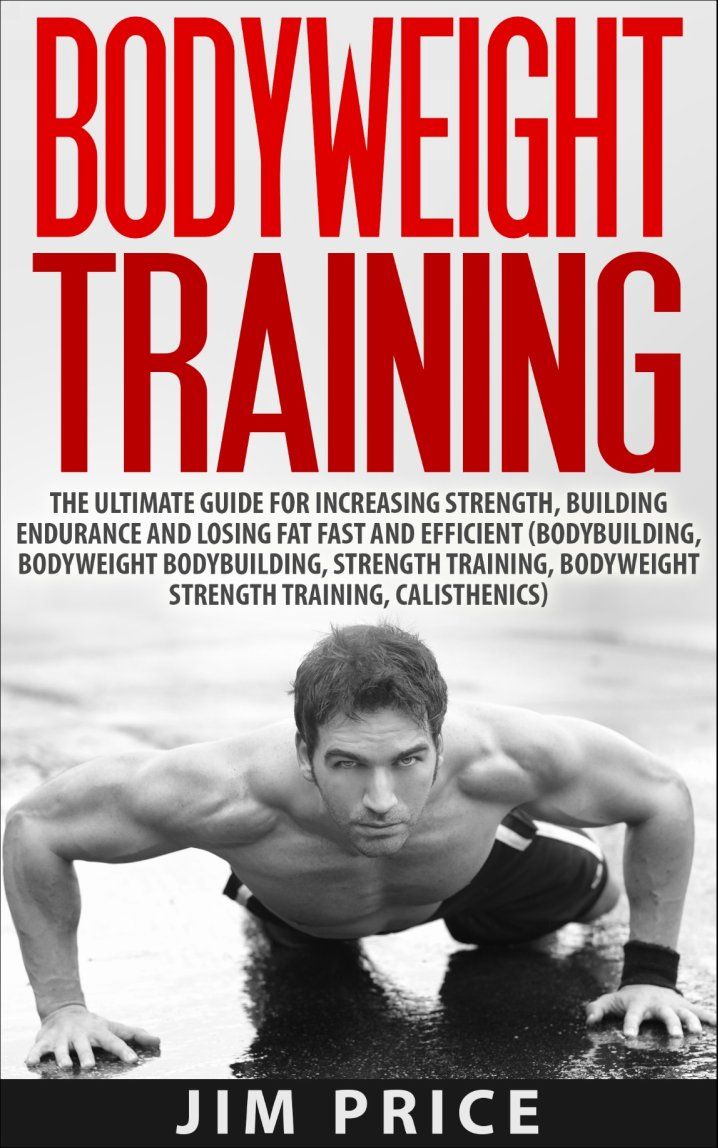
Body weight Training: The Ultimate Guide for Increasing Strength, Building Endurance and Losing Fat Fast and Efficient (Bodybuilding, Bodyweight Bodybuilding, Strength Training, Bodyweight Strength Training, Calisthenics)
Contents
Living a healthier life can not only extend your life, it can also improve the quality. Feeling physically better and having control over your own life can greatly increase your mental health as well. Although there are some aspects of physical and mental health that are beyond an individual's (and science's) control, there are many things that people can do to improve their quality of life.
 Exercising and staying physically fit are an important part of maintaining your health. Proper exercise and fitness can improve your health in many ways. It can:
Exercising and staying physically fit are an important part of maintaining your health. Proper exercise and fitness can improve your health in many ways. It can:
Improve the health of your heart and lungs (which lowers your chances of heart disease)
Lower your cholesterol and blood pressure (which lowers your chances of heart disease, stroke, and other chronic diseases)
Maintain your weight (which lowers your chances of heart disease, stroke, and other chronic diseases)
Improve your strength and flexibility (which makes daily activities easier and lowers your chance of osteoporosis, broken bones, pulled muscles, and other injuries)
Improve your mental health (by lowering anxiety and depression and increasing feelings of control and well-being)
The type of exercises you do and how often you do them can vary greatly from person to person, but all healthcare professionals agree that exercise is beneficial to everyone's health. Before starting any exercise program you should check with your doctor or healthcare provider.
There are many different kinds of exercise (walking, running, swimming, dancing, and weight lifting, to name just a few), but three basic types of exercise. A good exercise program will include some combination of all three of these types of exercise:
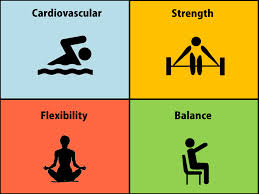 Cardiovascular exercise improves and strengthens your heart, lungs, and circulation and helps people lose weight. Cardiovascular exercise is any type of exercise that raises your heart rate to a 'target zone' (determined by your age, weight, and health). Some of the most commonly discussed types of cardiovascular exercise include running, aerobics, bicycling, walking, and stair climbing, but could also include dancing, skating, skiing, martial arts, tennis, or any type of exercise that raises your heart rate.
Cardiovascular exercise improves and strengthens your heart, lungs, and circulation and helps people lose weight. Cardiovascular exercise is any type of exercise that raises your heart rate to a 'target zone' (determined by your age, weight, and health). Some of the most commonly discussed types of cardiovascular exercise include running, aerobics, bicycling, walking, and stair climbing, but could also include dancing, skating, skiing, martial arts, tennis, or any type of exercise that raises your heart rate.
Strength training helps you by making you stronger and giving you better endurance (so you can do things longer). This makes day-to-day activities easier and reduces your chances of injury. While many people think of weight lifting when they hear 'strength training', there are many different types of exercises you can do to improve your strength (and you don't have to be a muscle-man or woman to do them.) Some common strength training exercises include sit-ups, push-ups, and using nautilus machines, strength bands, and free weights.
Exercises that increase your flexibility give you greater range of motion in your joints and make your body more supple, again, making day-to-day activities easier and reducing your chances of injury. Many people do specific stretching exercises to increase their flexibility but other types of exercise (such as dancing, yoga, and martial arts) can also improve flexibility.
The guidelines for how often, how long and what type of exercise you should be doing can vary greatly depending upon your health and age. However, in general, it is recommended that:
You exercise at least 3-5 times a week for 20-60 minutes at a time.
Your exercise includes some type of activity that involves large muscle groups and increases your heart rate (for example walking, running, cycling, or swimming) and also includes some strength training and flexibility exercises.
Before beginning an exercise program, remember to:
Check with your doctor or healthcare provider. Find out if you have any medical limitations you should be aware of (both physical limitations and possible limitations caused by medicine).
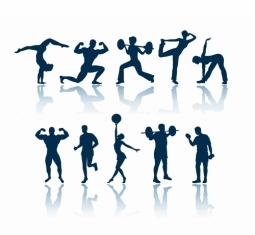 If possible, have an exercise test to determine your current level of fitness and work with a trained exercise professional to create an individual exercise program.
If possible, have an exercise test to determine your current level of fitness and work with a trained exercise professional to create an individual exercise program.
When exercising, remember to:
Stop immediately if you experience pain, nausea, dizziness, irregular heartbeat, or shortness of breath. Contact your doctor and describe what happened before continuing any sort of exercise.
Always do both warm-up and cool-down exercises for at least five minutes to make sure that your heart rate changes slowly and you don't hurt any muscles. Warm-up and cool-down exercises can be light activity (like slow walking or stretching).
Never "work through the pain" when exercising; you can only hurt yourself.
Drink plenty of fluids, especially water.
Wear appropriate clothing. (If exercising indoors or on a hot day, be sure to wear cool clothing. If exercising outside in cool weather, be sure that your head, hands, and feet are kept warm.)
Create an exercise program that meets your needs, but make sure that your needs and goals are realistic.
One of the many reasons people exercise is to maintain a healthy body weight. Weighing too much (or too little) can be very harmful to your health. But what is a healthy body weight? The answer to that question depends on many factors, including your age, gender, height, body type and shape, health, and overall fitness.
Increasingly, our society is becoming obsessed with body weight and image. Many of the images we see on TV, in magazines, in films, and elsewhere stress the importance of an 'ideal' body that is often very unrealistic or even impossible.
 While it is important to remember that maintaining a healthy weight can lead to a healthier lifestyle, its also important to remember that people's "natural" weight and body shapes vary greatly. Not everyone will be able to look model thin or muscle-man toned, no matter how often they exercise and how carefully they watch their diet. Behaving in unhealthy ways (for example going on extreme diets, having an extreme exercise program, or taking UN prescribed medicines or supplements) to try to change your body can do more damage than good.
While it is important to remember that maintaining a healthy weight can lead to a healthier lifestyle, its also important to remember that people's "natural" weight and body shapes vary greatly. Not everyone will be able to look model thin or muscle-man toned, no matter how often they exercise and how carefully they watch their diet. Behaving in unhealthy ways (for example going on extreme diets, having an extreme exercise program, or taking UN prescribed medicines or supplements) to try to change your body can do more damage than good.
You should work with your doctor or healthcare provider to figure out what your healthiest body weight should be. Remember, that weight depends on many things, including whether you are male or female, your age, your height, and if you have any health issues.
Having a regular exercise schedule that is developed for your specific needs is a great way to improve your health. But sometimes we don't have time to make it to the gym or want a break from our regular routine. Here are some quick tips to sneak some extra exercise into every day. For more ideas on how to work exercise into your schedule and how to find the right type of exercise for you, talk to your healthcare provider, a physical therapist, or do some research at the library .If you can, walk to work or the grocery store (or park further away) or take the stairs instead of the elevator.
Font size:
Interval:
Bookmark:
Similar books «Bodyweight Training:The Ultimate Guide for Increasing Strength,Building Endurance and Losing Fat Fast and Efficient (Bodybuilding, Bodyweight Bodybuilding, Strength Trai»
Look at similar books to Bodyweight Training:The Ultimate Guide for Increasing Strength,Building Endurance and Losing Fat Fast and Efficient (Bodybuilding, Bodyweight Bodybuilding, Strength Trai. We have selected literature similar in name and meaning in the hope of providing readers with more options to find new, interesting, not yet read works.
Discussion, reviews of the book Bodyweight Training:The Ultimate Guide for Increasing Strength,Building Endurance and Losing Fat Fast and Efficient (Bodybuilding, Bodyweight Bodybuilding, Strength Trai and just readers' own opinions. Leave your comments, write what you think about the work, its meaning or the main characters. Specify what exactly you liked and what you didn't like, and why you think so.

